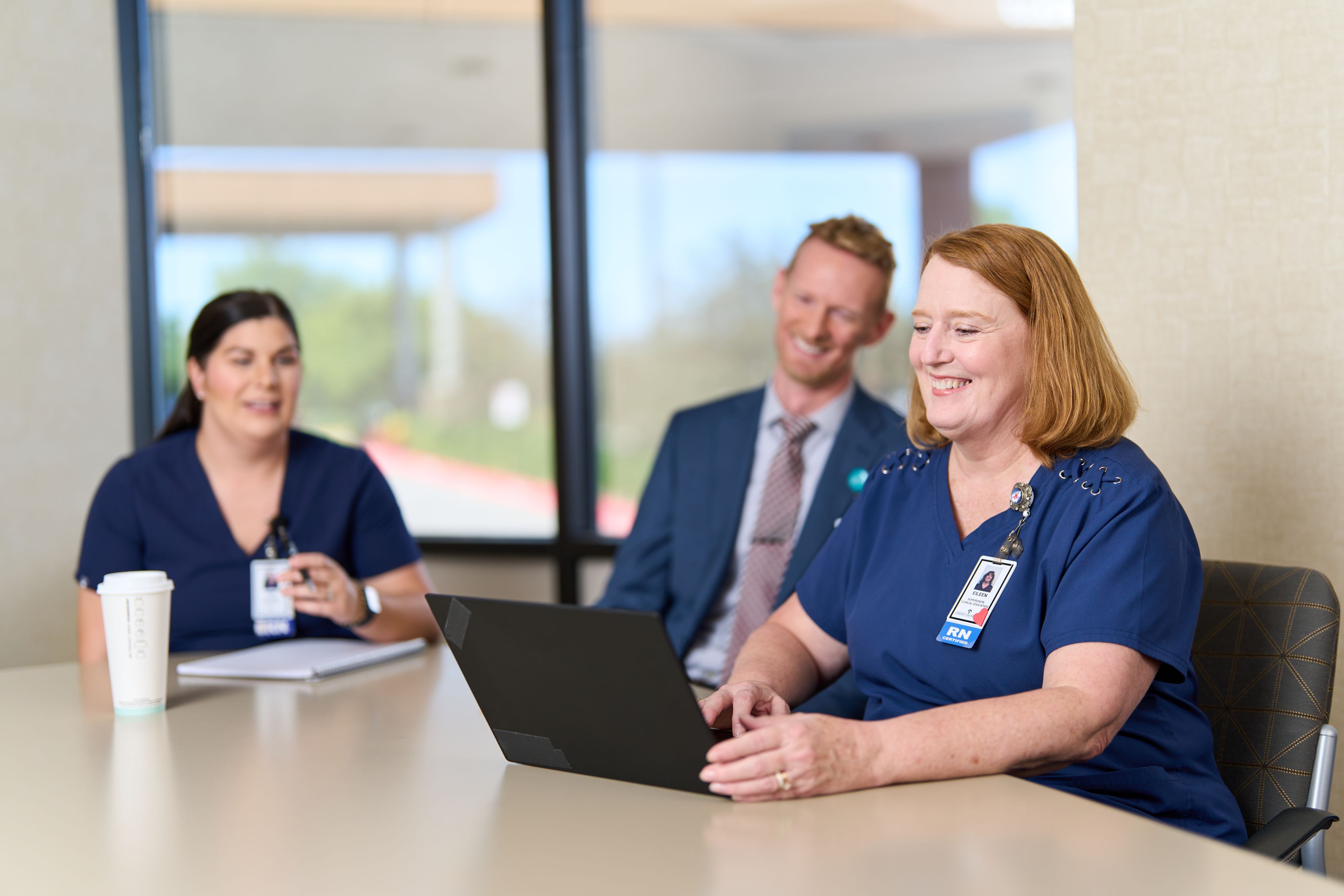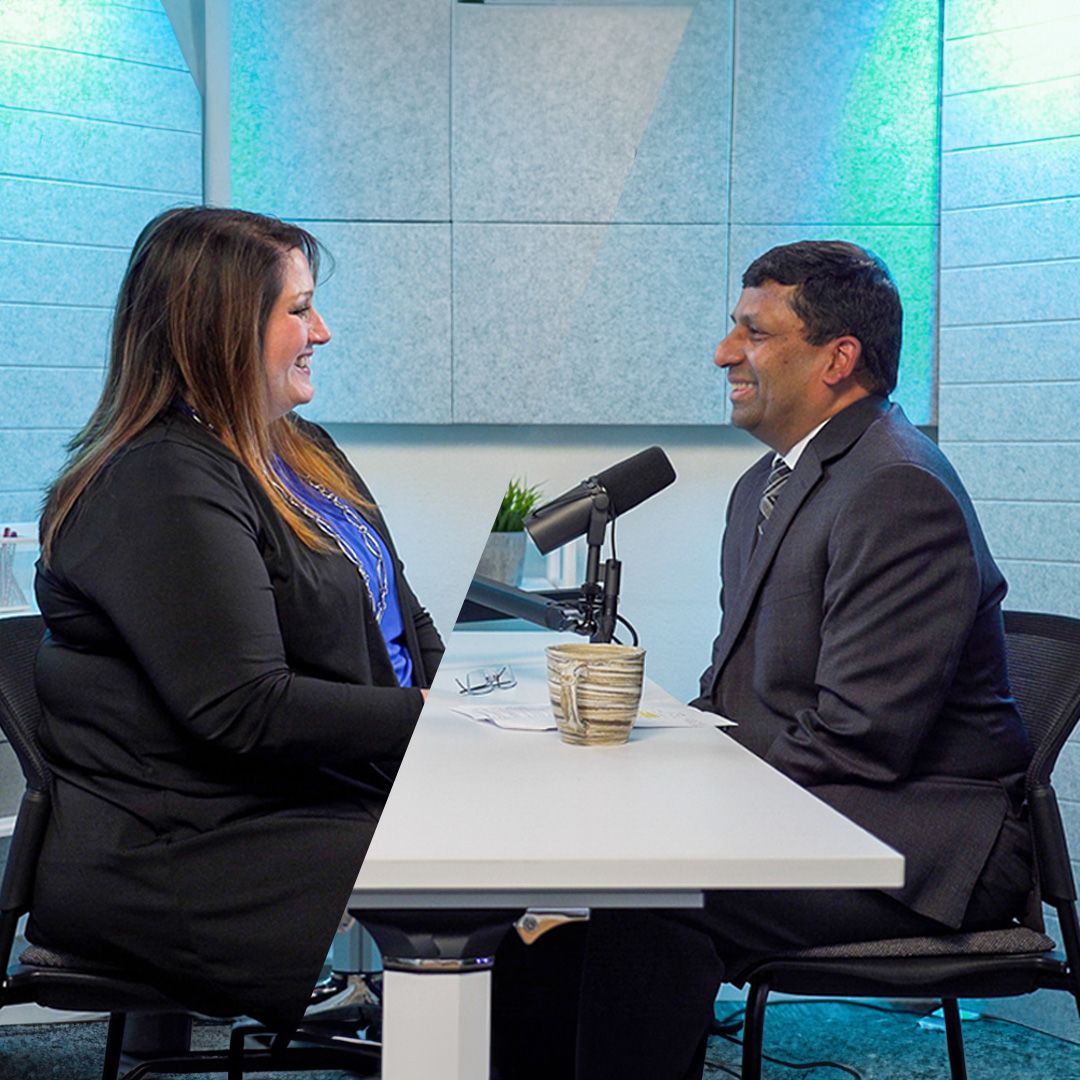Keys to a Thriving Culture
Episode #2
We are discussing the culture-building initiatives here at Liberty Hospital. We’ve spent the last year working on the fundamentals of culture – what’s working well, what’s not working well, what we need to improve upon, and all that we have accomplished under the direction of our President and CEO, Dr. Raghu Adiga.

Dr. Adiga has been in the Northland since 1997, working then as a primary care physician in St. Joseph. With a background in infectious disease medicine, he came to Liberty Hospital in 2004. From there, he took on several leadership roles, including Chief Medical Officer, until he was appointed CEO in 2022.
REGENIA: I’m so excited that you’re here with us today to share your wisdom, your experiences, and a little bit about what brought you to us and is keeping you with us. Could you tell us a bit about what drew you to medicine in the first place?
DR. ADIGA: I didn’t necessarily get into medicine on my own. I was young, and I grew up in India. And if you did well in high school and your grades were good, your parents thought you should be a physician or an engineer. Those were the two common choices for kids. Then, I got accepted to medical school. My parents asked me, “If you could be a doctor, why would you want to be an engineer?” So that’s how I ended up being a doctor. However, once I got into the field, there was no looking back. I can’t think of any other area that can impact people’s lives so much.
REGENIA: One of the things I love so much about healthcare is that it’s more than treating illness. It’s about helping people get to a place of wellness and helping them achieve more productive, fruitful lives. I love being able to be a part of that story. We have a personal component and interaction that no other field allows, and it’s an honor to do what we do. Is that how you felt as a practicing physician? What is that like for you on a personal level?
DR. ADIGA: Absolutely. That’s the beauty of our field. As a physician, it’s easy to feel overwhelmed, especially as a student or resident, where you may question your abilities. However, with experience and practice, you become more confident and adept at handling various situations. Believe in yourself, trust your knowledge and skills, and remember you have what it takes to make a real difference in people’s lives. You don’t always have a perfect answer to everything, but you have the knowledge and experience you’ve gained. Helping patients and their families during a difficult time is a powerful thing. By providing a diagnosis and guiding them toward recovery, we can greatly impact their lives.
REGENIA: You’ve been a practicing physician, a Chief Medical Officer, and now you are the leader of our ship, of our hospital. One thing you started working on right away was the culture of the organization. We were coming from a pandemic, and we needed to implement some things to keep people’s spirits up – to keep people eager and ready and wanting to come in and work with us day after day. What are some of those cultural initiatives you focused on?
DR. ADIGA: Coming out of a pandemic, any organization has to think through that. They struggle with identity and how patients and the community see them. We were no different. We are a mid-sized community hospital with a home-like, friendly atmosphere. That’s already there. But that alone isn’t enough. We need to make sure that the interactions between the staff, patients and families are better. My thought was to start with leadership and get that to trickle down to every staff member. And undoubtedly, the workforce is changing. The priorities of the younger generation are different, and we need to understand that and change with them.
With all that, I wanted to make sure that leadership was ready. One of the first objectives was to identify charismatic leaders who could understand what the change in culture needs to be. Over a year ago, we began our cultural journey, which has been extremely helpful. Leaders who listen and are vulnerable while being humble and authentic in sharing their thoughts and feelings – that has had immense value.
From there, we must examine our shared goals: Why are we in healthcare? What can we do that has the most impact on the patient’s well-being? When we focus on these questions, the entire organization moves forward together, and we have made significant progress in this regard.
REGENIA: When I arrived at Liberty Hospital, I was on the road, doing a lot of consulting work. I was eager to settle down in a place like this. It was the right decision for me, and I was able to rejuvenate myself by being a part of the cultural transformation here. I am proud to be a part of the team that strives to improve our quality of care. I believe we have made significant progress in achieving this goal.
Every hospital has improvements they’re striving to make every day, every moment. What things could we share with our listeners who may be at other healthcare organizations? What could be some quick wins for them? How can we make their voices heard in how we practice medicine and healthcare in our organization?
DR. ADIGA: Creating an environment where the right people can lead and communicate effectively is important. This involves identifying those people and giving them the tools and direction to succeed. Only then can we move in the right direction and achieve our goals. And, of course, listening and coming up with potential solutions.
You don’t have answers all the time. You can’t fix everything. But if you’re honest and you can explain what you’re doing and why, I think people are just fine with that. Understanding that and providing a purpose that’s going to have meaning in their lives and the lives of the people they are treating. You can create that environment. Things do get better. You just have to maintain it.
REGENIA: Getting there is one thing. Maintaining is an entirely different skill set that we’re continually learning. It’s about having purposeful, meaningful, worthwhile work. It’s like that story of the young man who says the work he wants to do is anything that pays $100/hour. It doesn’t matter what the work entails, he says it will fulfill him as long as it pays $100/hour. An older, wiser man accepts his offer and invites him to work the following day.
The young man comes to work and sees a big stack of bricks. The older man, his boss, says, "I want you to move that pile of bricks to the other side of the room, one brick at a time." The young man agreed to it, so he put the bricks from here to there. Then he asked the older man what he should do next, and he was told to move all the bricks right back where they were, one brick at a time. After a couple rounds of this the young man refuses to continue. He’d learned the lesson – that being fulfilled by your work is about so much more than an hourly rate. It's about having purposeful, meaningful, worthwhile work. And in healthcare, we are reminded every day that what we do matters.
DR. ADIGA: You know, the employee engagement survey that we do every year? There was a question that asked, do you have a friend at work? And that was an interesting question. We all had a friend at work. Why does that matter? We all have friends, but mostly they’re somewhere else.
But after all of this, I understand the importance of building culture and building relationships that work. It has a meaning. Now, you can look back and say, I have a good friend at work. And most people who are happy at work have friends.
REGENIA: Yes, they do. It’s so important. Just a few more questions for you. What do you rely on to be your true north when making decisions in the workplace?
DR. ADIGA: I’ve thought about this several times because sometimes the issues are pretty complex. However, at the end of the day, it all boils down to one thing: What’s the right thing to do? And if you get to the bottom of it, you’ll find the answer. Is this the right thing to do? Is this what you would want someone else to do to you? If you can answer that question, you can make that decision.
REGENIA: That’s really beautiful. A perfect answer. Dr. Adiga, thank you so much for joining me today. I can’t thank you enough.
Discover new episodes and stay connected to The Heart of Health and Science podcast.
Interested in career opportunities at Liberty Hospital? Click below to view openings, benefits and more.

